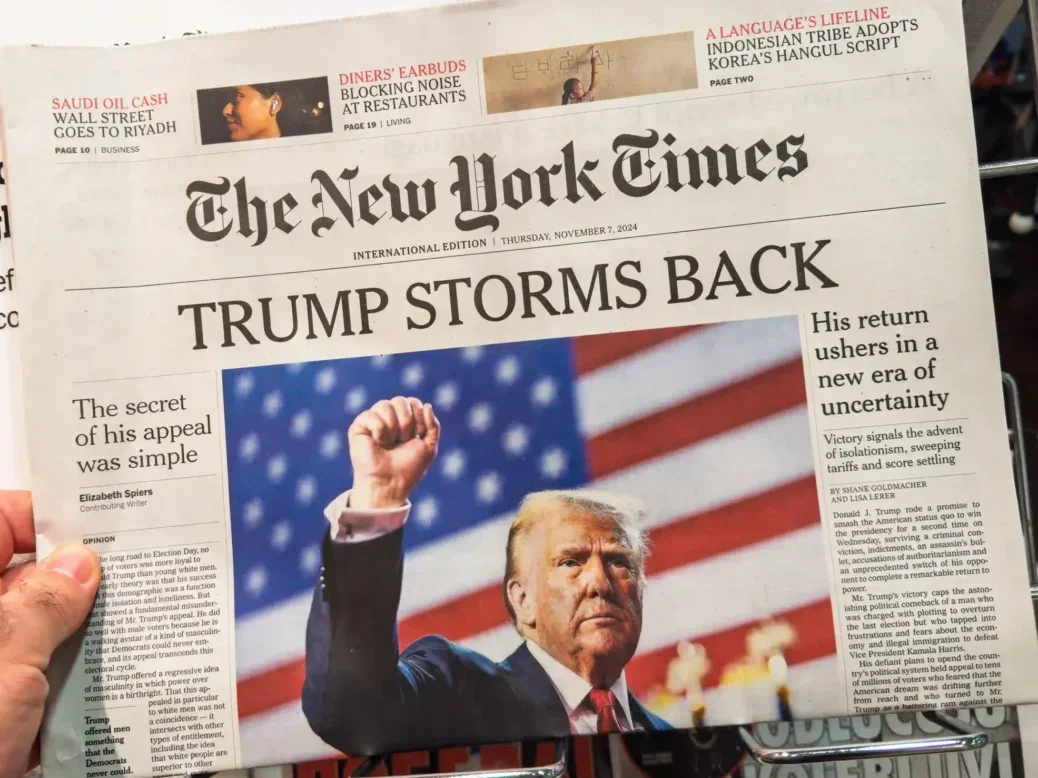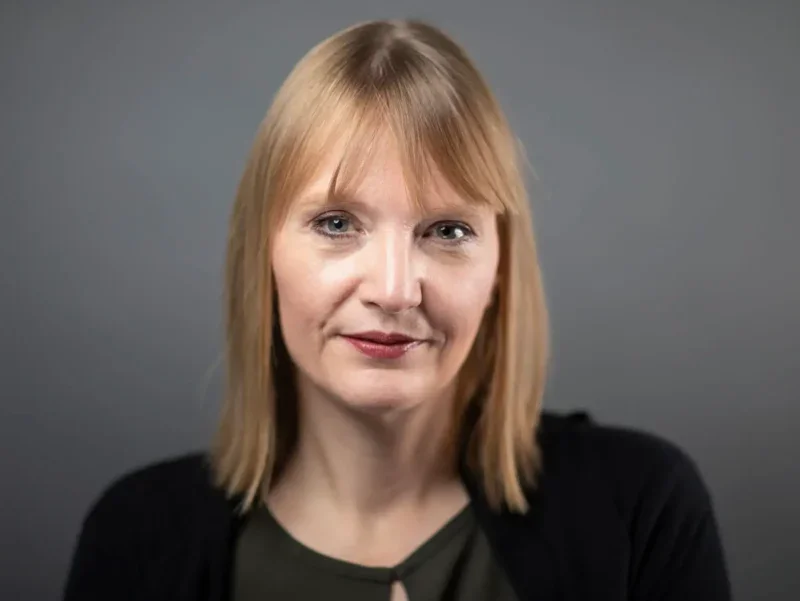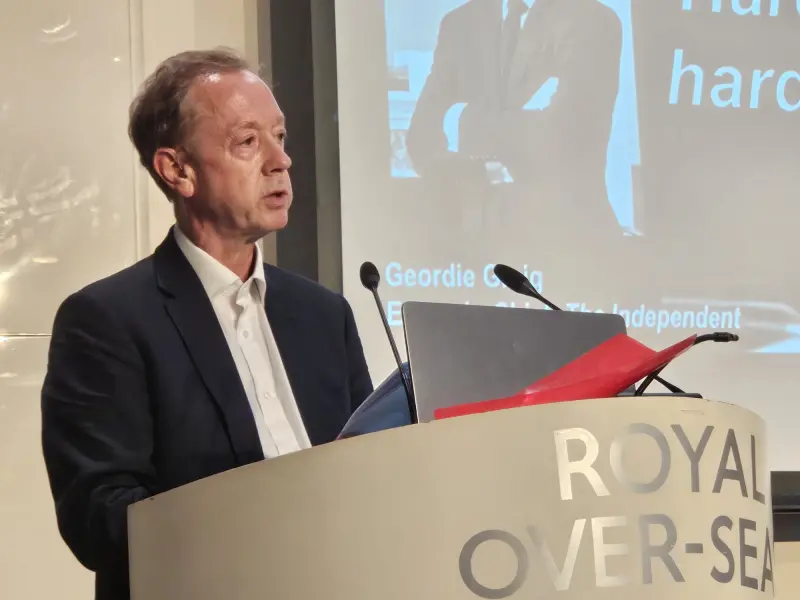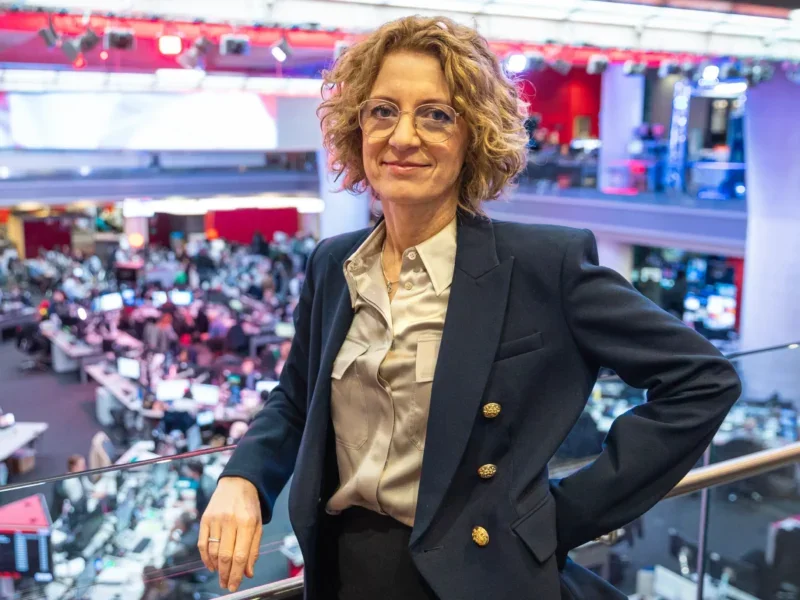
Most news publishers who expressed a preference endorsed Kamala Harris as US president, yet Donald Trump has been returned to office.
The margin of victory for Trump, winning both the electoral college and the popular vote, also surprised many in the media and appeared to be fuelled by a campaign which focused more on courting popular podcasters than it did legacy media.
We asked senior leaders at major US news publishers what the lessons are from the presidential election on connecting with audiences.
The Guardian’s US editor Betsy Reed suggested “so-called outrage cycles” may not deserve as much coverage in future as they did not prove to be deal breakers to voters, but she believes the media did do a “pretty good job” conveying the stakes of the election.
Francesca Barber, executive director of global newsroom strategy at Politico, said trust is gained by “listening, not just opining”.
Geordie Greig, editor of The Independent which has been quickly expanding in the US, said the election should remind the media of the importance of short-form video.
Katie Davies, editor of Dailymail.com, said the election only underscored that Americans are “consuming their news in more ways than ever before”.
BBC News director of digital Naja Nielsen said the election showed it is easy to become over-reliant on polls and “nothing beats boots on the ground”.
And The Hill’s director of audience and social media Sarakshi Rai said “being fair and nonpartisan” will help build trust with audiences and show there is not “some kind of underlying agenda”.
Read on to see each of their answers in full.
‘We need to reconsider reporting of outrage cycles’
Betsy Reed, US editor – The Guardian

“Overall, I actually think the media did a pretty good job reporting on the stakes of this election. But we did make a few mistaken assumptions this time around: that people would turn away from Trump because of his dangerous rhetoric and outrageous statements; and that the enthusiasm we observed at Kamala’s rallies would be sufficient to draw voters out, outweighing very real, well-documented concerns voters had about the economy, inflation, and the party in power.
“To be fair, The Guardian and the media did extensively cover voter dissatisfaction with the economy – in particular in our “Confidence Question” series – but we need to seriously consider how much reporting resources we devote to so-called outrage cycles moving forward, when it’s clear those things aren’t ultimately decisive to undecided voters.”
Trust ‘means listening, not just opining’
Francesca Barber, executive director of global newsroom strategy at Politico

“The way people are consuming media and information is changing rapidly – this election cycle saw the power of podcasts and loyalty with relatable, trusted voices amongst specific audiences. Think Call Her Daddy and Joe Rogan as major interview moments for both Trump and Harris.
“Trust is important here: it means listening, not just opining. It means having a direct relationship to audiences in the formats they are consuming (e.g. video, audio, shareable direct messages). And it means being clear who your audience is and building expectations and habit throughout the year, so that during an election cycle, they come to you.
“At Politico, our audience relies on our voice and authority to inform their daily professional lives. They rely on our geographic breadth to contextualize major global moments and our depth of reporting in each local market, to highlight the shifting policy and power dynamics beyond the horse race of an election.
“Now, we must continue to be thoughtful and creative with how and when we’re reaching our readers as we continue to keep up with the changing consumption and technological habits of our readers.”
‘Short-form video is key’
Geordie Greig, editor of The Independent

“The US election showed that, despite Trump’s attacks against many media companies, serious, independent journalism cuts through and still connects, as demonstrated by our record month in the US in September, in which we became the number one British brand in America.
“While we often think of America as being polarised, the exit polling also demonstrated just how many voters see themselves as independent. So there’s clearly a significant appetite for unbiased, authoritative news, and an opportunity for trusted brands to deliver this.
“Readers across the political spectrum seem increasingly to distrust what candidates are saying, but they still want to feel that they know the facts about the issues.
“More broadly, this election showed news brands what we already know. Audiences don’t consume news in the same way they did even ten years ago. Short-form video is key, and you need to meet audiences where they are. That’s why we stepped Independent TV into a higher gear and renewed our focus on platforms like TikTok.
“It remains to be seen whether the industry will experience a second ‘Trump bump,’ but all we can do is continue reporting, and finding our audience wherever they consume news. What we do is on the tin: we will stay independent.”
Audience wants ‘hard facts and unbiased news coverage’
Sarakshi Rai, director of audience and social media – The Hill

“The Hill paid close attention to what our audience wanted from political media outlets this election cycle – hard facts and unbiased news coverage along with data and in-depth analysis. The media needs to embrace being fair and nonpartisan in order to build trust with readers of all political stripes and convince them that there’s not some kind of underlying agenda to their coverage.
“There’s no denying that trust in media outlets has been low this election cycle and at The Hill we followed an editorial policy of not telling our readers what to think but allowing them to understand the facts and make up their own minds. It’s essential that news organisations reach audiences where they are at, not force them to meet them where they want them to be with their coverage that might skew one way or another.
“At The Hill we met our audience exactly where they were, whether it was with our video coverage, data analysis or editorial coverage. It’s not a one size fits all approach, and we made sure we had elements that people wanted from media outlets. Our partnership with Decision Desk also drove audience interest with a data and facts-first approach with polling aggregate numbers throughout the election cycle as well as a forecasting model and live election results.
“And as we looked deeper at the numbers, the results speak for themselves between Election Day and the day after – we not only gave our audiences what they wanted but grew it. TheHill.com saw 9.44 million unique visitors, over 18.34 million page views and 3.43 million video starts on the site.”
‘Americans are consuming their news in more ways than ever before’
Katie Davies, editor-in-chief – Dailymail.com

Dailymail.com saw record levels of traffic on election day, one of its highest-performing days in the US to date, and direct homepage traffic was the highest it had been for two years.
Press Gazette understands Daily Mail Tiktok videos were viewed a record 6.5 billion times in October and 5.3 billion times in September, and its election coverage on the platform received 427 million video views and led to almost 400,000 new followers.
The brand worked with polling firm JL Partners which projected a 287-251 win for Trump, which turned out to be closer to his actual 312 – 226 win than many other pollsters.
Katie Davies said: “This election cycle underscores the fact that Americans, now more than ever, are consuming their news in more ways than ever before. The Daily Mail US broke dozens of exclusives, sat down with insiders and people in power, and published some of the most accurate polling out there and we saw record-breaking amounts of traffic to our website leading up to and throughout the election, particularly on our mobile homepage. But we’ve also seen a tremendous appetite from our users to consume their news in new ways, be that TikTok, our social channels, video and podcasts and more.
“Under the Trump administration we’re going to continue doing what the Daily Mail does best – focus on the engaging stories our readers want to talk about in their daily lives – at the office, the bar, the school run etc. Our election numbers are a clear vote from readers that they love what we are doing and we will continue to hold those in power to account while maintaining our fun, audacious and distinctive Daily Mail voice.”
‘It’s easy to get over-reliant on polls’
Naja Nielsen, director of digital, channel and weather – BBC News

“I oversaw the BBC’s coverage from our Washington Bureau and, I have to say, I think BBC News overall covered it well.
“What in my opinion made BBC News stand out from especially a lot of the US media, was our impartiality and our focus on the voters.
“We also reported and analysed various polls, but it’s easy to get over-reliant on polls and as we have seen, once again, when it comes to gauging the mood among the voters nothing beats boots on the ground and our correspondents and reporters talking to the voters everywhere.
“On top of that first-hand reporting, our Voter Voices initiative proved very valuable. It’s a panel of voters with all types of views and backgrounds that feed into our reporting and help us present a range of views. There are many nuances in the viewpoints of Republicans as well as Democrats and all those who support neither and we wanted to capture that breadth.
“We are also lucky to have a team of expert Washington bureaux who know the country and its politics inside out and we were able to give audiences the benefit of a team at the top of their game – explaining the nuances of the US system and culture to a global audience.
“Our commitment to impartial and transparency also makes us uniquely placed in the US, as well as in the UK. Our investment in BBC Verify US made it possible for us to counter misinformation, and our curious and critical approach to all opinions is something a lot of people are looking for in these often very divisive times.
“This saw us reach huge numbers of people who were coming to us for a source of news they could trust – to cut through the noise and get a clear view. We never take sides, and I genuinely see all of our journalists reporting with open, curious and critical minds. I was following a lot of UK and US coverage and when it became clear, Trump would win, you could hear the tone change across most of US Election shows in one way or another, whereas our team kept being on the ball, reporting the story with no agenda.
“On Tuesday and Wednesday alone our digital journalism attracted around 61 million users – showing what an appetite there is, not only for news on the US election, but for the clarity and impartial view that only the BBC can give.”
Email pged@pressgazette.co.uk to point out mistakes, provide story tips or send in a letter for publication on our "Letters Page" blog
